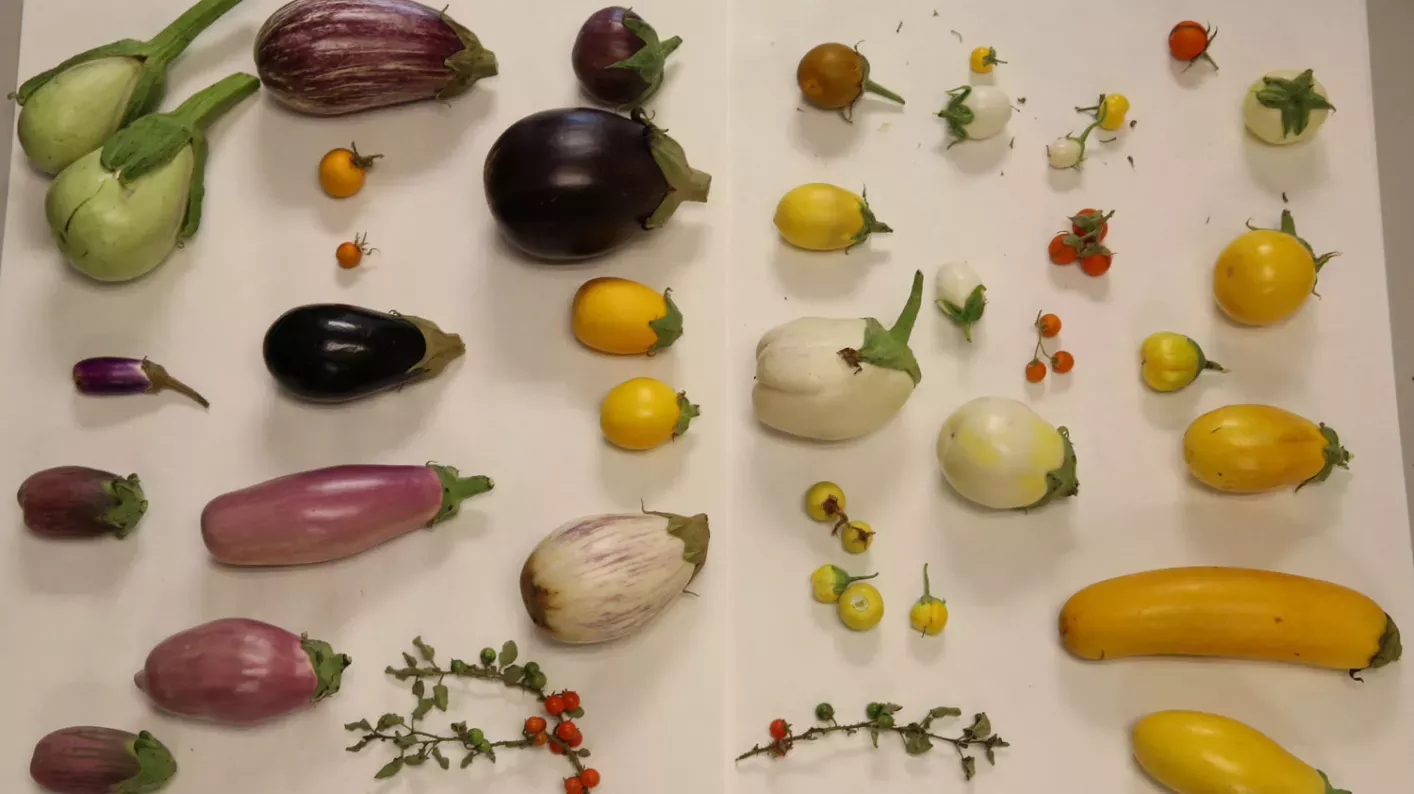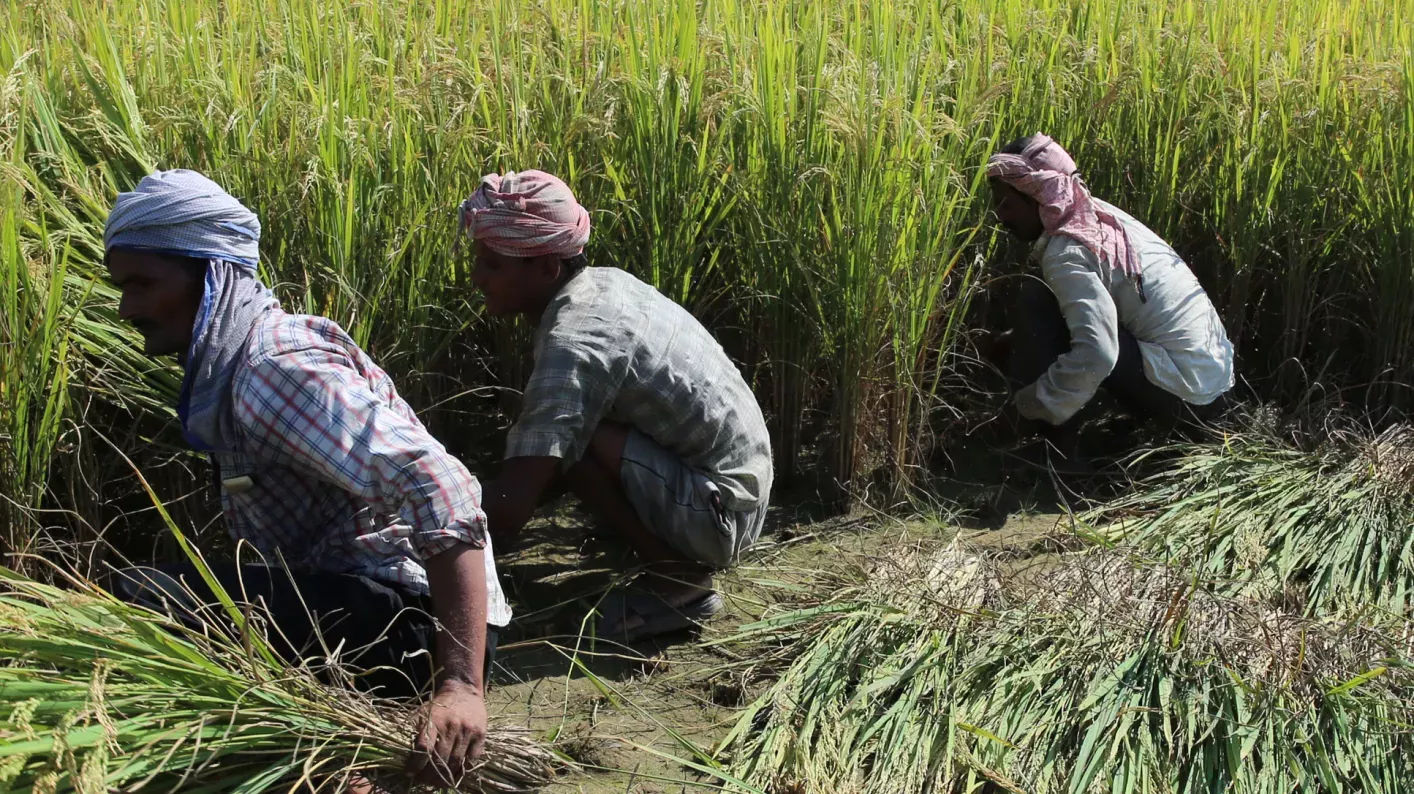Adapting agriculture to climate change
Collecting and protecting the wild relatives of the world’s most important food crops to safeguard our future food security in a changing climate.

Climate change and agriculture
Adapting agriculture to climate change is one of the most urgent challenges of our time. Rising temperatures, changes in rainfall, erratic weather patterns and the prevalence of pests and diseases resulting from climate change threaten agricultural productivity and therefore undermine global food security. This, coupled with the pressures of human population increase, will mean that the demand for food will be greater than ever.
Since the dawn of agriculture, over 10,000 years ago, humans have been selectively breeding plants based on characteristics such as taste, high yield, resistance to disease, growing conditions and easy harvesting. Even though there are around 7,000 species of food crops globally, just 12 of these account for approximately 80% of global consumption. While the domestication of plants has allowed human population growth, the subsequent loss of genetic diversity has left the crops vulnerable to pests, diseases and changing environmental conditions. Genetic diversity is the key to resilience against such threats and the best source of genetic variation can be found in the wild relatives of crop species.
Adapting Agriculture to Climate Change Project
The Millennium Seed Bank (MSB) in collaboration with the Crop Trust is engaged in a project called ‘Adapting Agriculture to Climate Change’. The main objective is to collect, protect and prepare the wild relatives of the world’s most important food crops, in a form that plant breeders can readily use to produce varieties adapted to the future climatic conditions that farmers in the developing world will soon be encountering.
The project focuses on the wild relatives of 29 crops which are of major importance to food security, covered by Annex 1 of the International Treaty of Plant Genetic Resources for Food and Agriculture. The crops are African rice, alfalfa, apple, aubergine, bambara groundnut, banana, barley, bread wheat, butter bean, carrot, chickpea, common bean, cowpea, faba bean, finger millet, grasspea, lentil, oat, pea, pearl millet, pigeon pea, plantain, potato, rice, rye, sorghum, sunflower, sweet potato and vetch.
Kew’s role
Kew staff have been involved in the collection of crop wild relative (CWR) occurrence data, using these alongside a global gap analysis to prioritise collections. The MSB is leading on the Collecting and Conservation area of the project. This includes supporting partners through the production of National CWR Collecting Guides, providing training and holding backup collections of CWR at the MSB. Once new CWR collections arrive at the MSB they are processed, tested and banked. This new material will also be distributed to pre-breeders and available for researchers. We also work on the communications aspect of the project.
Objectives
The project aims to:
- Identify those crop wild relatives that are missing from existing collections, are most likely to contain diversity of value to adapting agriculture to climate change, and are most endangered
- Collect them from the wild
- Conserve them in genebanks
- Prepare these and others already in collections (‘pre-breeding’) for use in breeding crops for new climates
- Make the resulting information widely available
Project Leader
Team
Aisyah Faruk
Timothy Pearce
Michael Way
Elinor Breman
Colin P Clubbe
Funded By
Government of Norway
- CWR Inventory - about the inventory
- Global Gap Analysis - methodology
- Seed collections - available via GENESYS - also see the MSB Seed List
- Capacity building - see the Seed Conservation Techniques course and capacity building in Malaysia and Ghana
- Seed passport and pre-breeding evaluation data
- Digitisation of CWR herbarium specimens
- CWR species Red List assessments
International
UK
Armenia
- Armenian Botanical Society
Azerbaijan
- Institute of Genetic Resources, Academy of Sciences
Brazil
- The Brazilian Agricultural Research Corporation (EMPRAPA)
Chile
- Instituto de Investigaciones Agropecuarias, (INIA)
Cyprus
- Cyprus Agricultural Research Institute (Program completed)
Costa Rica
- The University of Costa Rica
Ecuador
- Instituto de Investigaciones Agropecuarias, (INIA)
Ethiopia
- Ethiopian Biodiversity Institute (EBI)
Georgia
- Institute of Botany
- National Botanical Garden of Georgia
Ghana
- Plant Genetic Resources Research Institute (PGRRI)
Guatemala
- La Fundacion Para La Innovacion Tecnologica, Agropecuaria Y Forestal (Fundit)
Italy
- University of Pavia (Program completed)
Kenya
- Kenya Agricultural and Livestock Research Organisation
Lebanon
- Lebanese Agricultural Research Institute
Malaysia
- Malaysian Agricultural Research and Development Institute
Nepal
- Nepal Agricultural Research Council
Nigeria
- National Centre for Genetic Resources and Biotechnology
Pakistan
- The Pakistan Agricultural Research Council (PARC)
Peru
- Instituto de Investigaciones Agropecuarias, (INIA)
Portugal
- Museu Nacional de História Natural e da Ciência (Program completed)
Sudan
- Agricultural Research Corporation
Uganda
- Plant Genetic Resources Centre
Vietnam
- Plant Genetic Resources Institute
For more information on project partners see our project website.
Castañeda-Álvarez, N.P., Khoury, C.K., Achicanoy, H.A., Bernau, V., Dempewolf, H., Eastwood, R.J., Guarino, L., Harker, R.H., Jarvis, A., Maxted, N., Müller, J.V., Ramirez-Villegas, J., Sosa, C.C., Struik, P.C., Vincent, H. & Toll, J. (2016)
Global conservation priorities for crop wild relatives
Nature Plants 2: 16022
Dempewolf, H., Eastwood, R.J., Guarino, L., Khoury, C.K., Müller, J.V. & Toll, J. (2014)
Adapting agriculture to climate change: A global 10 year project to collect and conserve crop wild relatives.
Agroecology and Sustainable Food Systems 38: 369-377.
Vincent, H., Wiersema, J., Kell, S., Fielder, H., Dobbie, S., Castañeda-Álvarez, N. P., Guarino, L., Eastwood, R., Leόn, B. & Maxted, N. (2013)
A prioritised crop wild relative inventory to help underpin global food security.
Biological Conservation 167: 265-275

Conserving the cousins of our crops

Wild relatives crossing continents
.jpg.webp?itok=coUu1Lmn)
Aubergine: The mad apple

Gaps in global wild crop collections
Websites
Films
Beyond the Gardens: The Crop Wild Relatives Project
Crop Wild Relatives with Ruth Eastwood of Kew Garden's Millennium Seed Bank
Using the Herbarium Collections to produce Seed Collecting Guides
Crop Wild Relatives: Collecting and Capacity Building
Crop Wild Relatives: The Diversity of Wild Apples
Seed collecting is not easy: A crop wild relatives video-interview
Related links
International Treaty on Plant Genetic Resources for Food and Agriculture